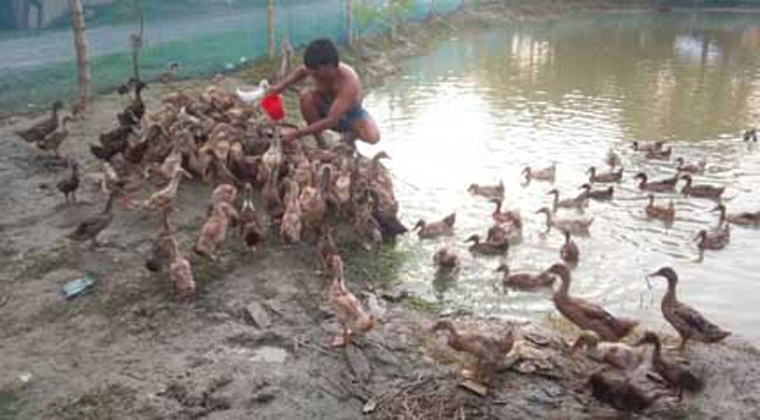
RAJSHAHI, March 5, 2023 (BSS) - Many women, particularly the marginalized and ethnic minorities, are becoming self-reliant through the venture of duck farming and it becomes a stable employment source in the region, including its vast Barind tract.
Young unemployed educated people are also seen joining the business making their own employment source. Hundreds of less-income and marginal households have become economically solvent by rearing ducks.
Shahzadi Begum, 40, a housewife of Aradighi village under Tanore upazila in the district, said she's now very happy as she has got the path of regular earning. She has no educational background but brought happiness to her five-member family through duck farming.
At present, she is selling duck-eggs regularly and meeting up various family needs," she added while talking to BSS on Friday.
Earlier on, the local office of World Vision Bangladesh donated her 33 ducklings and imparted need-based training on rearing those in modern methods.
She was also given 60 kilograms of improved poultry feed and other duck rearing inputs.
Like Shahzadi, 540 other distressed and extremely poor women in Talanda and Panchandar Unions under the upazila have become income generators after getting similar support. The venture has inspired many others to duck farming commercially.
Commercial farming of ducks including goose are gaining popularity in the region including its vast Barind tract for the last couple of years in the wake of gradually increasing nutritional demand and lucrative market price.
Duck products such as eggs and meat have a great demand in the local markets. So, commercial duck farming business is being adjudged as a great source of earning. Many successful farmers including women are making a high profit from their duck farming business.
Duck farming business has also become a stable employment source. Young unemployed educated people are joining the business making their own employment source. Hundreds of poor and marginal families have become economically solvent by rearing ducks.
There are more than 2,500 duck farms in Rajshahi division comprising eight districts and its farming has become more profitable and sustainable, whereBeel areas and wetlands are situated, said Dr Nazrul Islam, divisional Director of Department of Livestock Services.
He said many people raised ducks in both commercial and small scale to get meat or egg. Even, they raised some ducks in their own backyard with other birds or animals.
Mahtab Ali, a rural jobless person who completed graduation and failed to get a job, is presently owner of a duck farm and now able to manage his family properly. He is an inhabitant of Talanda village under Tanore upazila of Rajshahi district.
While talking to BSS Mahtab Ali said even five years ago, the income of his father, a poor farmer, was not enough to meet even the basic needs of their family.
However, he was committed to doing something positive to change the lot of his family. Therefore, he took a short training course from Rajshahi Youth Development Training Center in 2012, and set up a duck farm adjacent to his house.
Some of those poor fishermen families took loans from NGOs and started duck farming at their houses.
The Department of Animal Resources also came forward to assist them by supplying an improved, hybrid variety of ducklings.
Prof Dr Jalal Uddin Sarder, Dean of the Veterinary and Animal Science Faculty at Rajshahi University, said women, particularly the housewives, are mostly involved in rearing ducks of indigenous species.
Ducks need less expensive, simple and non-elaborate housing facilities resulting in very less cost for setting up commercial duck farming business.
They are very hardy birds and they need less care or management. They can adapt to almost all types of environmental conditions.
The ducks are mostly fed home-made feed. Farmers provide rice polish, boiled rice and broken rice as supplementary feed ingredients to ducks either singly or in combination.
As a whole, there are great potentials for an improvement of native duck production in the region by means of nutritional and management engineering, Prof Jalal Sarder added.